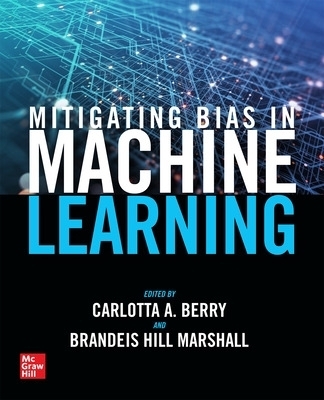
Mitigating Bias in Machine Learning
McGraw-Hill Education (Verlag)
978-1-264-92244-4 (ISBN)
Edited by engineering and computing experts, Mitigating Bias in Machine Learning includes contributions from recognized scholars and professionals working across different artificial intelligence sectors. Each chapter addresses a different topic and real-world case studies are featured throughout that highlight discriminatory machine learning practices and clearly show how they were reduced.
Mitigating Bias in Machine Learning addresses:
Ethical and Societal Implications of Machine Learning
Social Media and Health Information Dissemination
Comparative Case Study of Fairness Toolkits
Bias Mitigation in Hate Speech Detection
Unintended Systematic Biases in Natural Language Processing
Combating Bias in Large Language Models
Recognizing Bias in Medical Machine Learning and AI Models
Machine Learning Bias in Healthcare
Achieving Systemic Equity in Socioecological Systems
Community Engagement for Machine Learning
1 Beyond Algorithmic Bias
1.1 Introduction
1.2 Beyond Ethics in AI
1.3 What Is Algorithmic Justice?
1.4 Definitions of Algorithmic Fairness
1.5 Fairness Metrics
1.6 Methods for Fair Machine Learning
1.7 Tools to Help Detect and Mitigate Bias in Machine Learning Models
1.8 Best Practices to Build a Fairer Application
1.9 Chapter Summary
2 Going Beyond the Technical: Exploring Ethical and Societal Implications of Machine Learning
2.1 Introduction
2.2 Programming Approaches
2.3 Societal and Cultural Implications of Algorithms
2.4 Ethical Implications of Algorithms
2.5 Approaches to Mitigate Algorithmic Bias
2.6 Speak Up: Communicating Ideas with Digital Storytelling
2.7 Chapter Summary
3 Social Media and Health Information Dissemination
3.1 Introduction
3.2 MyHealthImpactNetwork: For Students by Students
3.3 Results of Data Inferential Analysis
3.4 Chapter Summary
4 Comparative Case Study of Fairness Toolkits
4.1 Introduction
4.2 Bias
4.3 Fairness
4.4 Applying Responsible AI
4.5 Results
4.6 What Are the Limitations of These Toolkits?
4.7 Chapter Summary
5 Bias Mitigation in Hate Speech Detection
5.1 Introduction
5.2 Background
5.3 Bias in Hate Speech Detection Systems
5.4 Bias Mitigation in Hate Speech Detection Using Transfer Learning
5.5 Bias Mitigation in Hate Speech Detection Using Transfer Learning
5.6 Adversarial Methods for Bias Reduction in Hate Speech Detection
5.7 Benefits and Pitfalls
5.8 Other Methods
5.9 Hands-on Exercise
5.10 Chapter Summary
6 Unveiling Unintended Systematic Biases in Natural Language Processing
6.1 Introduction
6.2 Unfairness and Bias in NLP Applications
6.3 Bias Taxonomy
6.4 Mitigating NLP Bias and Unfairness
6.5 Chapter Summary
7 Combating Bias in Large Language Models
7.1 Introduction
7.2 Vectorization of Stochastic Parrots
7.3 Natural Language Processing: Linear Decision Making for Nonlinear Language
7.4 Stage One: Data Collection
7.5 Stage Two: Fight Bad Math with Better Math
7.6 Stage Three: Model Constraints/Operations
7.7 Chapter Summary
8 Recognizing Bias in Medical Machine Learning and AI Models
8.1 Introduction
8.2 Defining Machine Learning
8.3 Building a Simple Machine Learning Model: Use Case
8.4 Health Care Bias and Inequities: Use Case
8.5 Chapter Summary
9 Toward Rectification of Machine Learning Bias in Health Care
9.1 Introduction
9.2 Case Study: Mitigating Bias in ML for Melanoma
9.3 Defining Types of Biases and Mitigation Techniques in ML Life Cycles
9.4 Machine Learning Fairness
9.5 Chapter Summary
10 Applying the Wells-DuBois Protocol for Achieving Systemic Equity in Socioecological Systems
10.1 Introduction
10.2 Equity Framework and Tool Application
10.3 Clustering Overview and Application
10.4 Applying the Wells-DuBois Protocol
10.5 Discussion and Future Directions
10.6 Chapter Summary
11 Community Engagement for Machine Learning
11.1 Introduction: Principles and Components of Community Engagement
11.2 Project Initiation: Steps of Conducting Community-Driven Environmental Data Science
11.3 How to Engage Communities in the Process: Case Study of the Mobile Lead Testing Unit Project in Newark, New Jersey
11.4 Chapter Summary
| Erscheinungsdatum | 30.09.2024 |
|---|---|
| Verlagsort | OH |
| Sprache | englisch |
| Themenwelt | Informatik ► Theorie / Studium ► Künstliche Intelligenz / Robotik |
| Technik ► Elektrotechnik / Energietechnik | |
| Technik ► Nachrichtentechnik | |
| ISBN-10 | 1-264-92244-2 / 1264922442 |
| ISBN-13 | 978-1-264-92244-4 / 9781264922444 |
| Zustand | Neuware |
| Haben Sie eine Frage zum Produkt? |
aus dem Bereich


